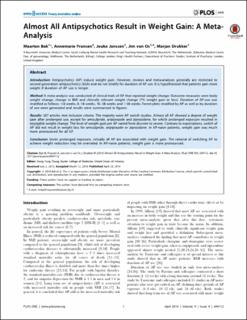Almost All Antipsychotics Result in Weight Gain: A Meta-Analysis
Journal article

Åpne
Permanent lenke
https://hdl.handle.net/11250/2786627Utgivelsesdato
2014Metadata
Vis full innførselSamlinger
Originalversjon
Bak, M., Fransen, A., Janssen, J., van Os, J. & Drukker, M. (2014). Almost all antipsychotics result in weight gain: a meta-analysis. PloS one, 9(4), e94112. https://doi.org/10.1371/journal.pone.0094112Sammendrag
Introduction
Antipsychotics (AP) induce weight gain. However, reviews and meta-analyses generally are restricted to second generation antipsychotics (SGA) and do not stratify for duration of AP use. It is hypothesised that patients gain more weight if duration of AP use is longer.
Method
A meta-analysis was conducted of clinical trials of AP that reported weight change. Outcome measures were body weight change, change in BMI and clinically relevant weight change (7% weight gain or loss). Duration of AP-use was stratified as follows: ≤6 weeks, 6–16 weeks, 16–38 weeks and >38 weeks. Forest plots stratified by AP as well as by duration of use were generated and results were summarised in figures.
Results
307 articles met inclusion criteria. The majority were AP switch studies. Almost all AP showed a degree of weight gain after prolonged use, except for amisulpride, aripiprazole and ziprasidone, for which prolonged exposure resulted in negligible weight change. The level of weight gain per AP varied from discrete to severe. Contrary to expectations, switch of AP did not result in weight loss for amisulpride, aripiprazole or ziprasidone. In AP-naive patients, weight gain was much more pronounced for all AP.
Conclusion
Given prolonged exposure, virtually all AP are associated with weight gain. The rational of switching AP to achieve weight reduction may be overrated. In AP-naive patients, weight gain is more pronounced.
